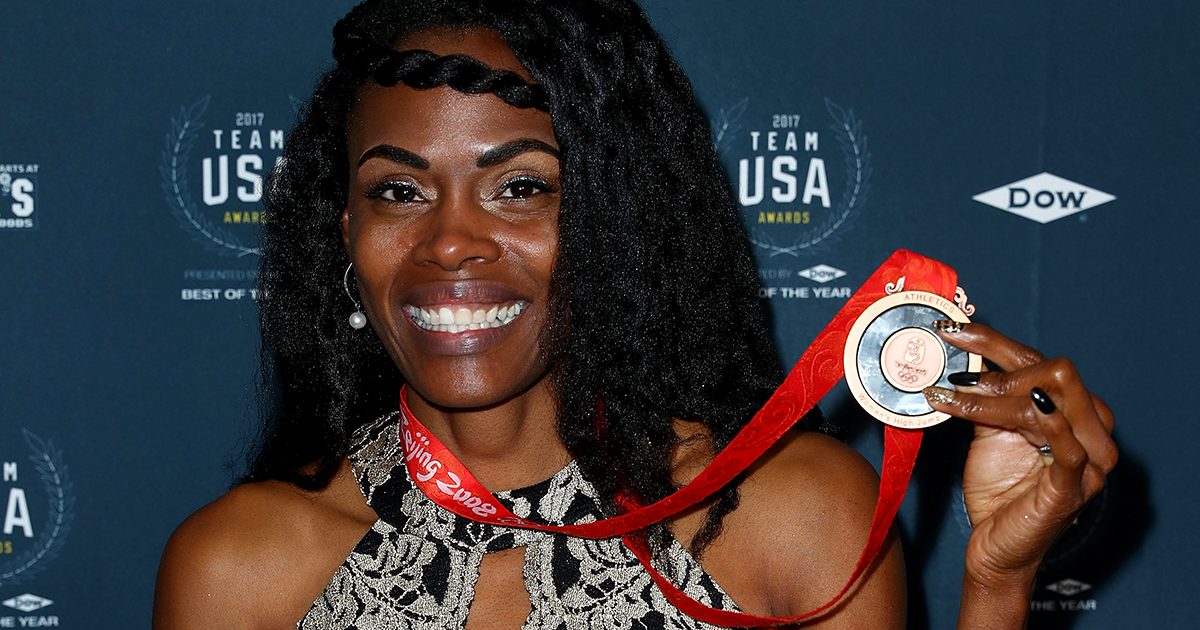The Importance of Advocating for Yourself
- Chaunté Lowe, a four-time Olympic high jumper, believes that if she listened to her doctor and waited to get a mammogram, she wouldn't be here today.
- Her story isn't uncommon, highlighting the importance of breast cancer screenings for young women and advocating for your own health.
- Lowe was diagnosed with breast cancer two years ago at the age of 35. She's now cancer-free, but continues to use her voice and her story to raise awareness.
Lowe was diagnosed with breast cancer two years ago at the age of 35. She's now cancer-free, but continues to use her voice and her story to raise awareness for breast cancer; urge people to be proactive, the risks of the disease and the importance of getting tested; as well as advocate for expanded resources for those with the disease, especially in the Black community.
Read MoreLowe's Breast Cancer Diagnosis & Early Mammogram
Her diagnosis, however, didn't come easy; she found a lump in her breast the size of half a grain of rice at age 34. The U.S. Centers for Disease Control and Prevention recommends that women begin getting regular mammograms starting at age 40. Since Lowe was only 34, she had to advocate for herself in order to get one.
In August 2018, she got her first mammogram, but her doctor dismissed her concerns, telling her the lump was just a lymph node. She shouldn't worry about getting another mammogram until age 40, her doctor said.
Lowe wasn't satisfied with her doctor's advice and had to take her health into her own hands. When she was finally able to get a second mammogram at age 35, it revealed that she had an aggressive form of breast cancer that disproportionately affects Black women. (The stage and exact type of her breast cancer hasn't been made public.)
Lowe's breast cancer battle drew international attention during the lead-up to the Olympic Games Tokyo 2020. She made appearances on NBC's TODAY Show, CNN and in various newspapers and websites, all to raise awareness. (As you can tell, she was using her voice well before being a spokesperson for a prominent cancer organization and drug company.)
There was an 11-month delay in getting a breast cancer diagnosis as she was met with pushback when trying to get a second mammogram. Because of this, Lowe underwent a double mastectomy and chemotherapy rather than a lumpectomy with radiation. A double mastectomy is a surgery in which both breasts are removed at the same time; a lumpectomy is a surgery to remove cancerous breast tissue along with a rim of normal tissue.
Related: Should I Have a Lumpectomy or Mastectomy?
Breast Cancer in Young Women
Dr. Ann Partridge, an oncologist at Dana-Farber Cancer Institute in Boston, tells SurvivorNet that about 260,000 women are diagnosed with breast cancer every year in the United States.
Dr. Ann Partridge talks about aggressive breast cancer in young women.
And about 11,000 women aged 40 and younger are diagnosed with the disease annually a small percentage of that 260,000. But in some ways, she says, a diagnosis for a younger woman, like Lowe, can often be even more devastating because the cancer is likely to be a more aggressive form, (again, like Lowe) and at an advanced stage. This is because screening for younger women isn't standard.
"Young women are more likely to be diagnosed with breast cancer that is more aggressive," Partridge says. "Their disease is more likely to be of the subtypes of breast cancer, because breast cancer isn't one disease the ones that are more aggressive and tend to be what we call a greater stage. That is, they're more likely to have bigger tumors and more likely to have lymph node involvement at diagnosis than older women."
Ladies, Get Your Mammograms
Dr. Connie Lehman, a director of the breast imaging clinic at Mass General Hospital in Boston, tells SurvivorNet that it's very important for women to get a mammogram every year, especially if you haven't yet gone through menopause.
Dr. Connie Lehman explains when you should get a mammogram.
"We know that cancers grow more rapidly in our younger patients, and having that annual mammogram can be lifesaving," Dr. Lehman says. "After menopause, it may be perfectly acceptable to reduce that frequency to every two years."
"But what I'm most concerned about is the women who haven't been in for a mammogram for two, three, or four years, those women that have never had a mammogram," she adds. "We all agree regular screening mammography saves lives."
In Lowe's case, that's exactly what her mammogram did for her it saved her life.
"I want to be completely clear: If you are between 50 and 74 and you have not had a mammogram in the last two years, you are overdue," Dr. Lehman says. "Please get a mammogram."
The Importance of Advocating for Yourself
Being your own advocate is always important when it comes to cancer care. And by doing so, you can make sure that your doctor sees you as an individual.
Advocating for Yourself While Navigating the Medical World
"One of the biggest things that I did from the very beginning was asking the right questions," Alex Echols, a patient advocate and lymphoma survivor, tells SurvivorNet. "It's our lives on the line." He credits these questions with making sure that doctors took him seriously and viewed him as a partner in his treatment.
Since Lowe was her own advocate, her cancer was caught early and she's now cancer-free. "I was dismissed because I was young, I was fit, I wasn't the stereotype of what breast cancer should look like. However, it was completely false, and it was wrong and when women that don't look the part are dismissed, it could have a potentially fatal impact," Lowe says.
Learn more about SurvivorNet's rigorous medical review process.


